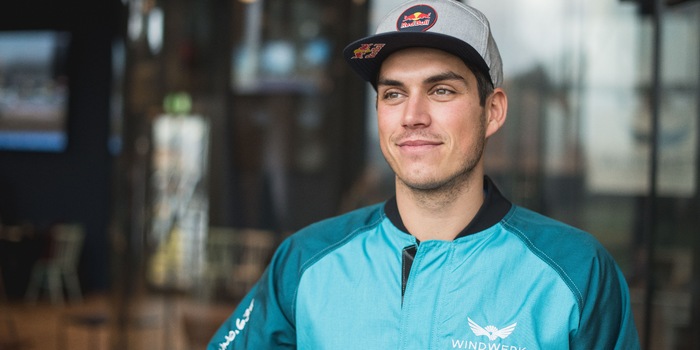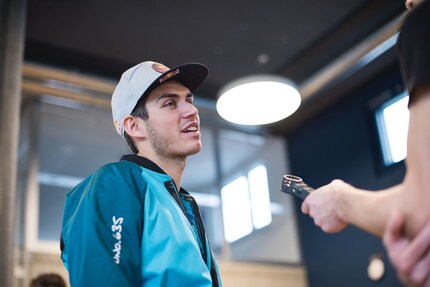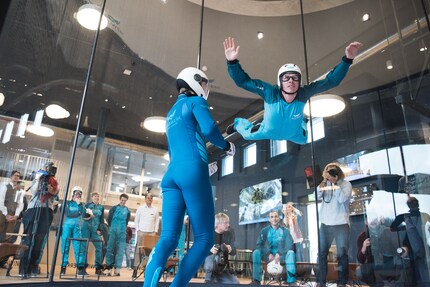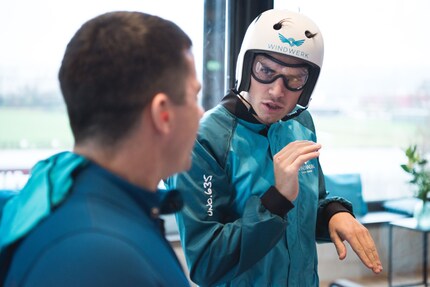
Background information
Breathless
by Michael Restin

In top-class sport, everything comes to a head at a decisive moment. Freestyle pro Elias Ambühl has spent years travelling between victory and falling, seventh heaven and the hard ground of reality. What goes on in his head?
When things get tight, the pressure increases. Only those who can handle it will leave all the training world champions behind and make it to the top. Elias Ambühl was there for years, competing in slopestyle and flying very successfully over the kickers of this world, especially in big air. Just watching makes me lose my pulse, he always seems to stay cool. It can't be right if you don't know whether you're going to end up in hospital or on the POD. Or is it? And if so, how does he do it?
What was it like to stand up there just before a decision in the Big Air?
Elias Ambühl, freestyle pro: I was often the last to start. Then you realise that there's something in the air and the nervousness builds up. But when I set off, it's - gobsmacked! - everything is gone.
What routines have you developed to combat the nervousness?
I already had a few tics and always had to get into my left ski first, for example. I also had the same cap under my helmet for years, so there was a bit of superstition involved. But in the end, I had to admit to myself that it all depends on how strong I am in my head.
Easily said. But how do you manage to block everything out at the crucial moment?Then I consciously go through everything I want to show again. That's the ritual. And then I try to realise it as well as possible. If I have other thoughts in my head, it doesn't work. I have to be fully in the moment.
At what point do you realise whether it's going to be good or not?I notice that pretty quickly when I jump off.

Are you basically on autopilot in the air and go through with the jump? Or do you make conscious decisions?
I can still control a lot in the air. The only thing I can no longer do is undo something. If I realise that things are going wrong, I can only try to save myself. I have to stay calm and decide on the best option that involves the least risk of injury.
How long was the adrenaline still there after a competition?
For a very long time. There were moments that were still going through my head in the evening. When I thought, now you've been really lucky. Or that it worked out really well.
You have now ended your competitive career. Will you miss anything?
I will continue to ride for films and projects. I will also reach my limits. I'll feel when I need to be ready and have my adrenaline rushes. I don't think I'll miss the competitions.

I met Elias Ambühl at Windwerk Winterthur, where the 26-year-old gained a new flying experience with body flying. Hovering in a wind current of up to 280 km/h - even the frequent flyer and helicopter pilot had never done that before. Not me anyway, which is why my brain kindly mixed me an endorphin-adrenaline cocktail.
And what about Elias Ambühl?
Does bodyflying give you an adrenaline rush or is it not enough?
I wouldn't say adrenaline, but a lot of fun. And I'm a very ambitious person. Things like this are always a challenge for me. If I don't master it straight away, I go out and I'm already thinking: how can I get better? I always want to push myself to the limit, that's what I enjoy.

Elias Ambühl was born on 26 March 1992 in Masein. The freestyle skier has won the bronze medal in Big Air at the X-Games four times and came second in the Big Air World Cup in the 2017/2018 season. He also set the world speed record for skiing backwards: 131.23 km/h. In November 2018, he announced his retirement from competitive sport.
Simple writer and dad of two who likes to be on the move, wading through everyday family life. Juggling several balls, I'll occasionally drop one. It could be a ball, or a remark. Or both.
Interesting facts about products, behind-the-scenes looks at manufacturers and deep-dives on interesting people.
Show all